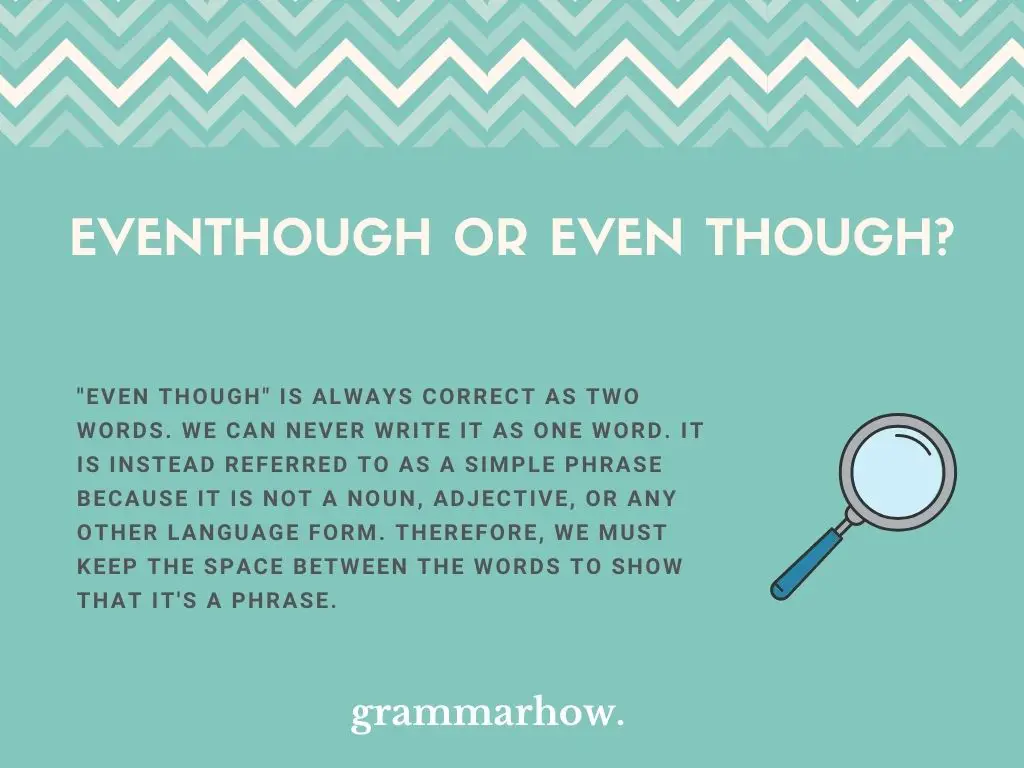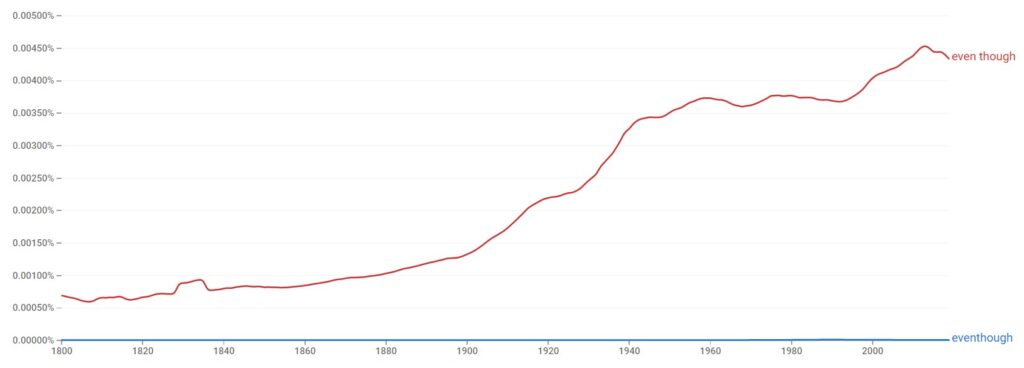“Even though” is one of those phrases in English that doesn’t come with an official structure or type. It’s not a noun, adjective, adverb, or anything in between. But we still need to know whether it’s one or two words, and this article will help you with that.
Eventhough vs. Even though
“Even though” is always correct as two words. We can never write it as one word. It is instead referred to as a simple phrase because it is not a noun, adjective, or any other language form. Therefore, we must keep the space between the words to show that it’s a phrase.

According to Google Ngram Viewer, “even though” is the only acceptable choice of the two. The huge differences in popularity tell us all we need to know about the one-word variation. There are no written cases where it works.

Also, we can go further and check out The Cambridge Dictionary and The Oxford Dictionary. Both of which provide us with entries for “even though.” They mention that it’s simple to the meaning of “despite that.”
Neither dictionary mentions that “eventhough” is ever correct. They also don’t show us examples or mention it as a brief variation on the spelling. You must avoid it.
Is “Eventhough” One Word?
“Eventhough” is incorrect. There are no exceptions to this either. You should never choose to group the phrase “even though” because it takes away from the intended meaning of what we’re looking for. Make sure you always include the space.
The AP Stylebook will allow us to group certain two-word phrases in specific circumstances. However, these circumstances only apply when working with adjectives or verbs. There are no reasons in AP Style why we should group “eventhough.”
Some people might choose to do so in favor of simplicity, but this is simply incorrect. It will make your sentence much harder to read if you group the words rather than leave them separate.
These examples will demonstrate how much harder it can be to read the one-word variation:
- Correct: Even though you’re clearly a bad person, I still think there’s a chance I can redeem you.
- Incorrect: Eventhough you told me this would never work out, I’ve still managed to find a way to keep you here!
- Correct: I didn’t have to say any of that, even though I knew it was my duty to do so.
- Incorrect: We could have had everything we wanted, eventhough you were always trying to fight me at every hurdle!
Is “Even though” Two Words?
“Even though” is always two words. Again, there are no exceptions to this. You should make sure to use “even” and “though” as different words that modify each other to come up with a meaning similar to “despite that.” This only works when they are two words.
There are no reasons why a native speaker would choose to group them together. If “eventhough” has ever appeared in English, it’s almost entirely due to a typo rather than a conscious choice.
Here are a few examples that should help you understand more about it:
- Even though he was much bigger than me, I still didn’t feel threatened by him when he came over.
- I thought about it, even though I knew there wasn’t much I could have done to fix the situation.
- Even though I had time to get it done, I still didn’t want to help you out.
- We weren’t going to come to this event, even though we had the invite, because we didn’t like the idea of it!
Tip To Remember The Difference
Finally, it’s time to look over a quick tip. Once you’ve got your head around what we’re about to teach you, you’ll never make the mistake of writing “eventhough” again.
The best tip we can give you is to say the sentence with “even though” aloud. You will notice that you have to take time to stress both “even” and “though.” This shows that you must always include a space between them to give them the stress they deserve.
“Eventhough” as one word would be much more rushed in speech. If we said it aloud, it would sound like the words have become one, but this doesn’t stress them correctly, so it’s incorrect.

Martin holds a Master’s degree in Finance and International Business. He has six years of experience in professional communication with clients, executives, and colleagues. Furthermore, he has teaching experience from Aarhus University. Martin has been featured as an expert in communication and teaching on Forbes and Shopify. Read more about Martin here.

